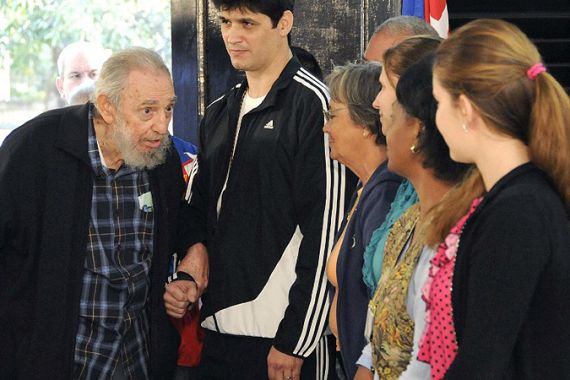Fidel Castro votes in Cuba election
Ailing ex-revolutionary leader makes surprise appearance in Havana to cast his vote in parliamentary polls.

Ailing Cuban revolutionary leader Fidel Castro has made a surprise appearance in Havana to vote in parliamentary polls, expressing confidence in the revolution despite a decades-long US trade embargo.
Castro’s visit to the voting precinct in Havana’s El Vedado neighbourhood was the main event in Sunday’s elections, during which Cubans chose 612 members of the National Assembly as well as deputies of local legislatures.
The 86-year-old is said to have spent up to an hour talking to other voters and the media after casting his vote.
About 8.5 million Cubans took part in the polls that featured no opposition candidates.
|
“What strange elections, in which there is no choice and all the candidates think the same“ – Yoani Sanchez, Dissident blogger |
Authorities billed the event as a celebration of Cuban democracy, “which is different” from those in other countries.
Cuban dissidents dismissed the vote as a farce, however.
“What strange elections, in which there is no choice and all the candidates think the same,” Yoani Sanchez, the dissident blogger, commented.
“It’s an electoral farce.”
Before Sunday’s appearance in Havana, Castro had not been seen in public since October 21, when he accompanied Elias Jaua, the current Venezuelan foreign minister, to the Hotel Nacional.
“I am convinced that Cubans are really a revolutionary people,” Castro told reporters who surrounded him at the polling station.
“I don’t have to prove it. History has already proven it. And 50 years of the US blockade have not been – nor will it be – able to defeat us.”
Long-running embargo
The US issued a commercial, economic, and financial embargo against Cuba in October 1960 after Castro’s revolutionary government nationalised the properties of US citizens and corporations.
It was broadened to become a near-total embargo in 1962 as Cuba’s alliance with the Soviet block became apparent.
 |
| All candidates for elections have been selected by ruling Communist Party or its affiliated associations [AFP] |
In his comments, Castro also praised the creation of the Community of Latin American and Caribbean States (CELAC), whose presidency Cuba formally assumed last week at a summit in Santiago, Chile.
Set up in Caracas in December 2011 at the behest of Venezuelan President Hugo Chavez, CELAC groups all nations from across the Americas except the US and Canada.
The Cuban chairmanship of the group marked the country’s full regional reintegration and was seen as a major diplomatic coup for Havana.
“This was a step forward which we owe to the efforts of many people, including Venezuelan President Hugo Chavez,” Castro said.
Chavez has not been seen or heard from since his last cancer operation on December 11 in Havana.
But Diosdado Cabello, the Venezuelan National Assembly president, said on Sunday that Chavez was now making steady progress in his recovery.
Castro, who rose to power after the 1959 revolution, ceded the presidency to his younger brother Raul, 81, in July 2006 for health reasons.
His long absences from public view have led to rumours that his health has worsened.